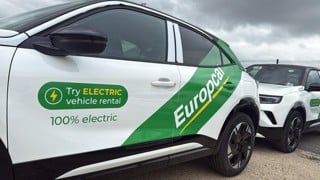A new report, published by the Aldersgate Group, sets out a series of policies aimed at delivering deep cuts in surface transport emissions.
‘Shifting emissions into reverse gear’ argues that improving the overall efficiency of the transport system will be just as important as investing in new technologies and infrastructure. As a result, it is calling on the Government to take an integrated system approach to decarbonising transport, rather than treating each mode of transport separately.
UK carbon emissions have fallen by more than 42% since 1990, thanks mainly to actions in the power sector. However, there has been relatively little overall change in the level of greenhouse gas (GHG) emissions from the transport sector over the same period, which is now the largest emitting sector of the UK economy accounting for 28% of GHG emissions.
Making substantial cuts in surface transport emissions, which accounts for the majority of domestic transport emissions, is therefore essential to delivering the UK’s climate targets cost-effectively, it says.
Nick Molho, executive director, Aldersgate Group, said: “With emissions flat-lining for several years now, Government needs to fundamentally rethink its transport policy and work across departments to deliver the modern and ultra-low emission transport system the UK needs.
“This means taking an integrated view of the whole transport system to ensure that new transport infrastructure projects deliver the best environmental and economic outcomes, empowering local authorities to develop low-carbon transport systems, incentivising greater resource efficiency across the automotive industry and targeting innovation support to technologies that can help cut emissions in difficult areas such as heavy commercial vehicles, long-distance journeys and rail.”
The report says that Government policy should:
- Establish an integrated road and rail strategy to ensure that the most environmentally and economically beneficial infrastructure projects are taken forward. This should include shifting more road freight onto the UK rail network and developing a national bus strategy.
- Devolve long-term funding and key powers to local authorities to cut emissions from short journeys. With 72% of journeys in urban areas being under five miles, local authorities have a key role to play to cut emissions. Similar to the stable budgets given to Network Rail and Highways England, the Government should devolve long-term revenue and capital funding to local authorities so they can develop their own integrated transport strategies and empower them to require new housing developments to be better connected to sustainable forms of transport. As part of this, the decline in funding to supported bus services and the development of cycling and walking networks must be urgently reversed to cut car dependence for local journeys.
- Improve local air quality by moving the most polluting journeys outside of urban areas, through supporting the development of Urban Consolidation Centres (UCCs) to reduce inner-city freight traffic and implementing an ambitious national network of Clean Air Zones (CAZs) with common standards.
- Grow the UK’s global manufacturing base for low and zero emission vehicles, by setting rapidly tightening CO2 emission standards for vehicles after the UK leaves the EU, guaranteeing upfront purchase grants for electric vehicles until they reach cost parity to help drive the market in the mid-2020s, and delivering widely accessible electric vehicle charging infrastructure, with a particular focus on areas where the business case is more complex such as in rural locations.
- Provide targeted support to complex parts of the transport sector where zero emission technologies are not yet deployable at scale, such as long distance journeys and Heavy Commercial Vehicles (HCVs). This should include trialling different technologies on UK roads and rail lines, such as hydrogen and renewable biomethane, and pursuing an ambitious rail electrification strategy to close the gap with the UK’s continental neighbours.
- Use measures announced under the Resources and Waste Strategy to drive greater resource efficiency across the UK transport system. Measures such as extended producer responsibility schemes and product standards have an important role to play to incentivise the use of more resource efficient components such as long-lasting performance tyres, the re-use and reconditioning of electric vehicle batteries for second-life appliances and a much greater use of secondary materials in vehicle manufacturing.
Molho continued: “Given the significant challenges faced by the UK’s automotive industry following the announcements by Jaguar Land Rover, Ford, Nissan and Honda, the UK cannot afford to be left behind in the global race to design and manufacture zero emission vehicles.
“To ensure the UK is at the forefront of the shift to cleaner mobility, the government must commit to long-term financial and regulatory measures that will grow that market, such as through predictable purchase grants and tightening vehicle emission standards.”
Justin Laney, general manager of fleet at the John Lewis Partnership, added: “Radical change is needed to decarbonise long distance heavy trucks. These vehicles are the most challenging to tackle, but also the ones that deliver the biggest benefit.
“Our view at John Lewis Partnership is that biomethane is the best solution for the next 20 to 25 years, and after that electrification, whereby trucks are supplied by power from an electrified overhead line.
“Government has been very supportive of low carbon trials, and it is important that continues, combined with creating the right tax and fuel duty regime that provides a sound, long term business case.”






















Login to comment
Comments
No comments have been made yet.